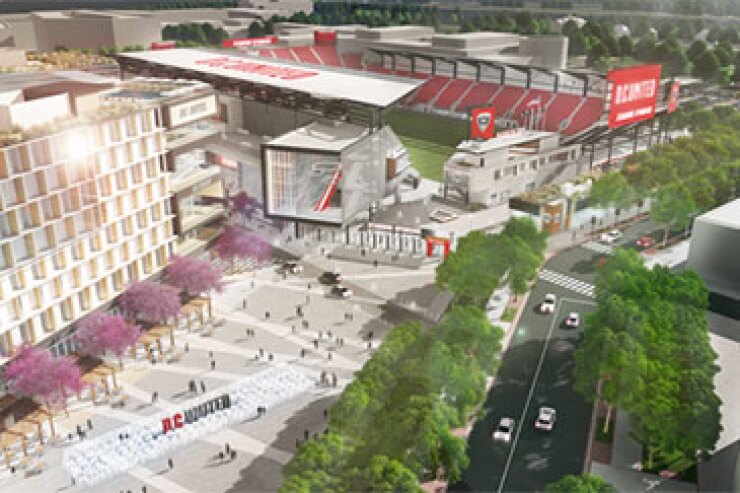
WASHINGTON – The District of Columbia has paved the way for construction of a $300 million stadium for Major League Soccer's D. C United by handing over land in Buzzard Point to the team.
"This week, the Deputy Mayor's Office for Planning and Economic Development (DMPED) officially completed all pre-construction and infrastructure obligations as outlined in the agreement terms for a new soccer stadium in Ward 6," the office announced on Tuesday. "The District now hands over the site to D.C. United to begin construction on the $300 million state-of-the-art facility."
The stadium, which is to be built under a public-private partnership between the district and D.C. United, will be financed with up to $150 million from each of the two sides.
DMPED spokesman Joaquin McPeek said the public money will include $138.9 million from the district's Office of Budget and Planning. Of that amount, $117.9 million will come from the D.C. Department of General Services' budget, including $106.3 million allocated for fiscal 2017 and $32 million reprogrammed from other projects. The remaining $21 million of the $138.9 million is reprogrammed funds. It's unclear whether bonds will be issued for the project, McPeek said.
Should the project need additional funding of $11.1 million for the full $150 million, those funds would have to be budgeted by the district's office of budget and planning, said McPeek.
The team now has control of stadium construction. Team officials are expected to attend a D.C. Zoning Commission hearing on Nov. 2.
D.C. Deputy Mayor Brian Tenner said this week that the district met its transfer date goal, as projected in plans.
"The district has found the back of the net, preparing the site for construction – on time and on schedule – exactly when we said we would," Tenner said.
Under the P3 arrangement, the district was responsible for land acquisition and site preparation, including utility relocation, demolition and environmental remediation. D.C. United is responsible for the design, construction and operation of the stadium, as well as ancillary development on the site.
The 20,000-seat stadium, tentatively named D.C. United Stadium, is expected to generate roughly 900 local jobs as well as more than $1.6 billion in total economic activity, according to DMPED.
D.C. Mayor Muriel Bowser estimated the stadium, which will only be used for D.C. United, would generate $6 million in annual tax revenues for a total of nearly $200 million in total tax revenue over its 30-year lease.
The stadium will be located in Buzzard Point, an industrial area on the Anacostia River, roughly three blocks from Nationals Park, home of Major League Baseball's Washington Nationals, in Ward 6, the south-central area of the district.
Officials broke ground for the site infrastructure in April, seven months after D.C. filed for eminent domain of the Buzzard Point site.
"Since that time, the district has worked expeditiously to prepare the land, including site control, above-grade structure demolition, and disposal and removal of outdated utilities," the DMPED said on Tuesday.
Construction of the stadium is expected to start early next year and to be completed in spring 2018.
In December 2014, the D.C. Council approved the District of Columbia Soccer Stadium Development Act of 2014, giving the district eminent domain authority for the land for the stadium.
In the act, the council said that the more than 50-year-old RFK Stadium, the current home of the United, is "near the end of its useful life" and without a new stadium, the team would ultimately relocate.
According to the development agreement, the ground lease is for 30 years with three five-year option extensions. The site reverts to the district at the end of the lease, the base of which is $1 per year.
The lease provides for a phased-in real estate tax where D.C. would collect property taxes at 25% of the full rate after five years, 50% after 10 years, 75% after 15 years, and full taxes due from 20 years through the end of the lease.
The team will also pay the district $2 for each ticket sold from year 11 through the end of the ground lease.
A "No Relocation Agreement" was reached between Bowser and D.C. United, effectively keeping the team for the duration of the lease. The soccer club had also considered Poplar Point in D.C., Prince George's County in Maryland, and Loudoun County in Virginia before settling on Buzzard Point.
D.C. used a purchase and sale agreement to secure land for the stadium from the Potomac Electric Power Company and Super Salvage Inc. It used its eminent domain power to secure additional land from developer Akridge.
Proponents have said the stadium would accelerate the redevelopment of Buzzard Point as well as the adjacent Capitol Riverfront neighborhood, and enhance economic vitality in the entire district.





